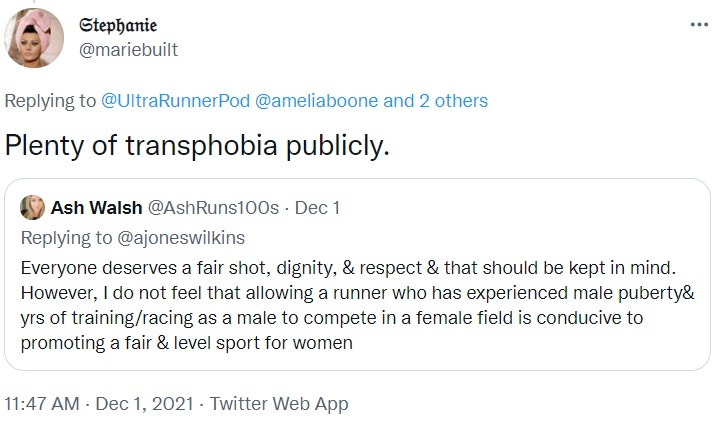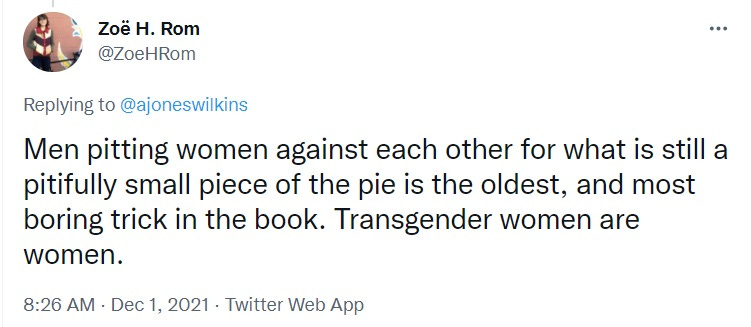An already controversial and gender-rigged Hardrock 100 lottery is loaded with a troublesome new variable
Whether running's "inclusion" crowd will have to resolve an internecine conflict this weekend is literally a matter of chance
From a dispatch of this newsletter dated September 16, 2021:
In the meantime, I'm waiting for the first serious transgender controversy to strike the ultrarunning world, as this is not merely inevitable but on raw statistical grounds imminent. That will make for some high-octane online parleying, as it will pit a generation of Wokezillas against people whose beards first reached their asses during the Reagan administration.
That post expanded on the thesis that most of today’s media and other jibber-jabber framed as advocacy for women runners is—the established boorishness of many men notwithstanding—a wave of poorly disguised gambits by individual women to secure status advantages over their female peers. One obvious example among many such transparencies: Who self-sorts into the “body positivity”/“stop talking about physical traits” camp, and who chooses to either remain silent or carry on with the ass-waggling, boobie-baring, fake-white-smile-having Instagram show? Is there anything that seems to distinguish these two groups of people on a surface level?
As for the quoted material, the “first serious transgender controversy to strike the ultrarunning world,” which I characterized as “imminent” two and a half months ago, is here, or at least the set-up for such a controversy is locked into place.
On Wednesday, Eric Schranz of UltraRunnerPodcast dropped this into his December 1 Ultramarathon Daily News round-up:
Something tells me that when the MUT women and allies pushed hard for more female inclusion into the Hardrock 100, they weren’t planning on transgendered women taking up spots in the lottery pool. Let’s see what happens this weekend.
As is usually now the case when it comes to any statement that even incidentally takes a jab at certain niche sensitivities, Schranz’s observation was not discussed in the comment section of his post, but instead was litigated on Twitter. But before getting to that, I’ll describe how the ultramarathon in question has become a special target of “progressive” efforts to equalize male-female representation in long-distance running.
The Hardrock 100 is a race designed for roving black holes of personal suffering, even by the enviable standards of pain-seeking set by ultramarathoners as a group. It includes over 66,000’ of climb and descent up and down the San Juan Mountains. Imagine running a 5K with just over 2,000’ of total elevation change—you probably can’t, because that’s an average grade of 12.5 percent, steeper than the annual 7.6-mile race up the Mount Washington Auto Road. The entire route is said to be littered with carefully laminated issues of Penthouse magazine from the 1970s, Domino’s pizza boxes, and half-eaten human remains.
The race was cancelled in 2019 owing to snow danger and again last year thanks to COVID-19, sparing up to billions of lives.

The event is limited to 145 runners, which means that only about 7 percent of the 2,000 or so annual bib applicants gain entry. This year’s lottery is scheduled for tomorrow. And it’s a complexly weighted lottery: A given individual’s odds of entry vary depending both on gender and previous experience (e.g., having zero to four previous Hardrock finishes increases an applicant’s odds over those of a “veteran” with five or more), and accounting for COVID-19 deferrals has thrown an additional ingredient into the 2022 entry mix.
If you want to read about the entire complicated lottery set-up, start here. But the only thing you really need to know is that a massive push has been underway in recent years to get more women into the race.
In July, Zoë Rom wrote an article for Trail Runner about this, titled “The Hardrock 100 Wants More Women On The Startline” (the event itself probably has no opinion either way).
Without describing it as such, Rom details the coup of sorts that led to the latest version of the Hardrock lottery. After Trail Sisters founder Gina Lucrezi became a member of the Hardrock 100 board of directors, the race adopted a policy of having the percentage of women race entrants be no less than the percentage of women lottery entrants.
Predictably, the thumb only goes on the scale here in one direction; if the percentage of female names drawn exceeds the percentage of women in the lottery, the result will stand—i.e., no “correction” will be made to allow the "fair” number of male masochists into the race.
Because the Hardrock 100 has, like most ultras, historically featured a preponderance of older, white male runners, any lottery system that rewards previous finishers (as it should) also definitionally contributes to preserving the demographic status quo. Imagine votes for old white guys running for U.S. Congress being given extra weight compared to those of other candidates, and you get an immediate sense of why equality mavens had issues with the old system.
But nothing about how this lottery is organized—including turning it into something that may not mathematically qualify as a true lottery anymore—really matters unless women have demonstrably been denied rightful spots in the Hardrock 100. And despite the full-throated push Rom describes and contributes to in her story, published over four months before the lottery deadline, only 18.0 percent of this year’s lottery applicants are women. You can find several metric crap-tons of social-media noise about the need for more women to run the Hardrock 100, but almost none from runners themselves eager to occupy space in the event’s purported lady-void.
It might just be the case that fewer women than men want to tackle something as absurd on its face as the Hardrock Hundred-Mile Endurance Run. After all, this is evident in various areas where equality of opportunity plainly exists. Yet the author of a profile of Lucrezi for Ms. asks, “Why are women considered unworthy or incapable of running down a trail?” A better question is, “Why are so many of these ‘equality’ articles filled with whiny, blatantly false premises?”
Around 95 percent of firefighters and airline pilots are men; the same gross imbalance is seen in the opposite direction in kindergarten teachers, dieticians/nutritionists, and cosmetologists, over 90 percent of whom are women. We* can attribute most or even all of these differences to social conditioning, if our minds have been turned to snot at some CRT-corrupted Northeastern liberal arts school, or we can open our eyes and observe that in the world around us, male primates tend to court thrill and danger in all sorts of guises—much of this behavior being strictly for show—while female primates favor nurturing behaviors and other forms of up-close care.
It might be true that the feeling that every social niche should contain equal numbers of men and women runs aground of the fact that men and women, on average, simply make different choices. In fact, when you think about it, given the undeniable physiological differences between male and female humans, wouldn’t it be a remarkable coincidence if men and women did collectively think and behave in virtually indistinguishable ways?
There appear to have been no structural issues keeping women out of the Hardrock 100 in the past—another admission Rom makes in her story without necessarily meaning to. But thanks to yet another sign-of-the-times variable, the opportunity for us all to participate in a post-lottery ruckus remains solidly intact. Which brings me, with my usual crispness, to Schranz’s Wednesday musing.
Among the female names on the list of 2022 Hardrock lottery entrants is Grace Fisher. A Women’s Running profile of Fisher before this year’s Western States 100, framed as usual as an attack on transgender people and their rights, includes this:
Following her entry into this year’s event (she earned a spot through a qualifying race and the event’s lottery), Western States organizers created a formal policy regarding competitors and gender, joining a growing number of race directors across the country to address the topic. In particular, transwomen runners have faced backlash from those who claim they have testosterone levels that give them an unfair advantage against other women.
The Western States policy allows runners to register in the gender category they identify with. Transwomen are required to have hormone treatment for at least one year prior to the race, though officials won’t ask for medical proof unless a transwoman is a top female finisher and someone contests it.
Fisher wound up turning in an uncharacteristically poor performance at Western States, winding up 20th in the women’s division and therefore “evading” the need to document the anti-androgen medication(s) she’s ostensibly been taking. As her Ultrasignup race results page shows, Fisher’s finishes while running as a female have generally been very impressive. So much for the “No one is looking to deny women victories, it’s all about being able to participate” trope. Fisher also says that taking anti-androgens has affected her running and overall strength; so much for the “the magnitude of testosterone’s effects is in dispute” trope, too—at least when it is convenient to portray someone with the indelible advantage of having experienced male puberty as significantly weakened nowadays by a lower testosterone level.
If, as Schranz implies, Fisher is selected, the logical response would be for the same women who have made increasing the percentage of women in the Hardrock 100 a veritable mandate to start yelling “injustice.” It seems deeply doubtful that Fisher began identifying as a woman to do better in races, but given the absence of wiggle-room afforded the perceived motives of white men c. 2021, it would be consistent with the behavior of Wokish women to perceive dubious intent in Fisher or anyone who once identified as a man and is now winning women’s races and prizes.
Oh, I did mention Twitter, didn’t I? After viewing Schranz’s post the other day, someone quoted him without either linking to his post or tagging him, which on Twitter is often a lazy signal for people to initiate a pile-on under the innocent aegis of Just Being Curious. And even when it’s not, that’s how people respond to it anyway.

Most of the disagreeable responses are of the sort that are strictly limited to Twitter dialogue, because even really stubborn people don’t try “trans women are women” in real life or other dialectic situations in which people can object to nonsense without being blocked or otherwise ignored.
Transgender women differ markedly from birth women. If these were identical descriptors, a special adjective would not be required to modify one of them. Try walking around saying, “Half-marathons and ultramarathons are marathons” or “Miniature Pinschers are Doberman Pinschers” and see how many eyebrows in the vicinity remain flat.
Trans women do not have female reproductive organs. Even those who undergo full surgical transition will never ovulate, become pregnant, or menstruate. Aren’t some of these things central to the human female experience? And if not, who is going to step up and explain how these facts leave the assertion “trans women are women” standing? From a sports perspective, remember, not a legal one.
(One hint that Ms. Conner is making this claim in desperation is the appending to it of “full stop,” an empty argument-ender tantamount to yesterday’s “’Nuff said” and a catch-all rhetorical middle finger to anyone with the nerve to be making sense and upsetting the feelings of those preferring to dwell outside scientific reality.)
Then there’s the obligatory “everyone who disagrees with my extremist views is a bigot” stuff.
Twitter insanity is insanity, end of story.
The whole “We’re not going to talk about this! It’s settled!” approach to narcissism-based social reform is one of the primary reasons few left-of-center people and no living conservatives can stand Wokism, even when they may fundamentally agree with some of its advocates’ points. It’s not just or even mainly their ideas that chafe; it’s their manic insistence on shutting down contrary talk in any form—traditionally a reliable sign that the contested opinions are flawed or baseless altogether. People with winning and thoughtful, defensible ideas typically enjoy expanding on and defending them; they don’t yell “Sit your ass down and accept the gospel.”
And it really is common for people to express ideas just that way.
As always, the irony is as hilarious as it is ghastly. This person is engaging in the epitome of senseless and destructive spouting, while accusing a popular, even-handed podcaster who does his best to accommodate every viewpoint in the sport of being a “terrible voice.” But this attempt to diminish Schranz’s standing is commensurate with commenters on his website scolding him for “amplifying” my words by linking to my posts, and with complaining that he doesn’t cover women’s running enough (even though that would just be mansplaining as well as stealing work from all the capable, eager female content creators out there).
See, not only do these folks refuse to defend anything they say with more than “full stop,” they also don’t want you referencing the very existence of dispositive or merely antagonistic material. Wokesters are so lost in the shuffle of their own hysteria that the ones who criticize Schranz (and to be fair, I don’t think he has many, but however many are out there, they’re a pain in his ass whenever possible) don’t seem to grasp that someone can express a simple thought without it representing far-flung antagonism or even traitorship.
Alternatively, some people appeal to their own presumed authority.
Remember, in this year’s Hardrock 100, only 16 women toed the line; every slot in the event really is precious, and Boone, despite having earned respect in the ultrarunning community, can’t speak for everyone else in the lottery.
And Rom, well, she really doesn’t get it at all.
There is no rational basis for the idea that male observers of this ultradrama have something to gain, even yuks, from trying to stoke dissent between trans women and birth women. Men and others who comment from the outside on this topic are honestly curious about how the women (and men) who want more women to occupy precious Hardrock 100 sports will justify their responses should Fisher’s name be drawn tomorrow, because those responses will no doubt be entirely supportive, as, as such, dishonest in many if not most cases—a clear instance of people falling in line with the “inclusion” narrative no matter how much this contradicts a different core principle of inclusion.
The fact that certain battles are only waged in Internet haunts where shouting and other forms of manipulation rule every discussion should be a tip-off to anyone about the insincerity and “Better to look good than be good” ethos underlying Wokism. When you see someone asserting a fact that obviously isn’t a fact in the service of some greater philosophy, you should question the validity of the greater philosophy.
Ultimately, the only way to settle the matter of transgender women in running races in a way that provides satisfaction to the greatest number of stakeholders is to insist that people whose everyday, adopted gender identity conflicts with their birth sex use their birth sex for sports purposes. No one I know wants to exclude transgender people from running events or any other walk of life. Every contentious transgender- or intersex-athlete episode to reach public eyes has ruffled feathers only because some girl or woman has been unfairly denied something. Nowhere within running do I see efforts to exclude individuals from an activity that even the most callous observer understands is immensely therapeutic.
But this is all about fairness, isn’t it? And when “inclusion” fanatics start renovating institutions to their liking, they fail to account for a lot of the scenarios their schemes may incidentally create. At present, they are used to getting their way by instilling literal fear in race directors and owners of businesses large and small. But not only do they not know how to argue points honestly or intelligently, they’re ill-equipped to deal with situations that make it difficult to establish a neat hierarchy of “Who has suffered the most historical oppression here?”
Not incidentally, the responses Schranz and others get even when being polite about bones of Wokish contention exemplify why I don’t bother writing contrary things with any grace whatsoever. Even were the tendency to soft-pedal criticism of uncool antics in my blood, I prefer not to waste time with politeness no one notices or cares about. Not only have the zealots among us not earned politeness, but it never does any good—in the end, the zealots will paint folks as evil for saying things they don’t like no matter how those folks express themselves and no matter how sensible their ideas sound to non-Twitter-tainted minds.
PERIOD.







